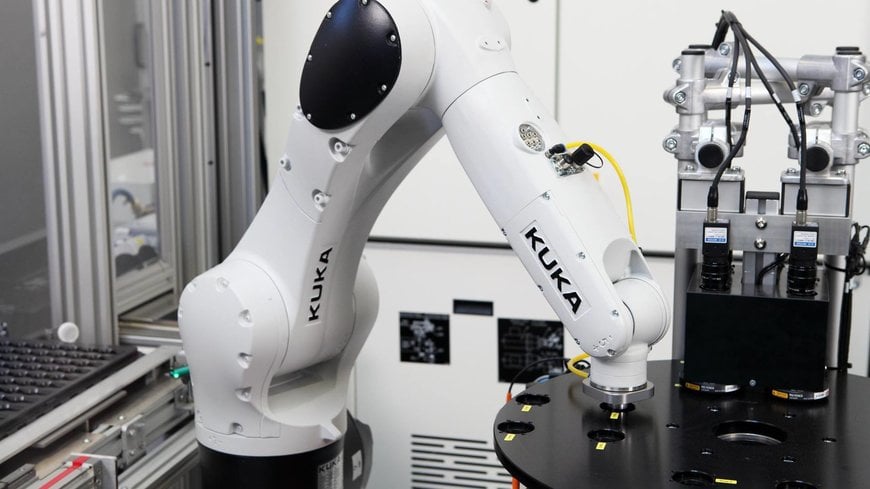www.ptreview.co.uk
13
'21
Written on Modified on
Efficient automation in the plastics industry
Greater efficiency, greater cost-effectiveness and greater flexibility: there are a number of benefits attributed to robotic process automation within the plastics industry, all which ultimately support process optimisation.

Medium-sized companies in the plastics processing industry are retaining competitive advantage through automating the manufacturing process – whether it's handling, loading and unloading of injection moulding machines or machining components.
Here KUKA UK Plastics sector manager Adam Hudson, provides an insight into the trends and challenges within the Plastics industry, how recent events have changed opinion, how i4.0 is encouraging us to adapt, and ultimately the returns achieved through automation.
How has the plastics industry diversified post COVID-19/BREXIT and are attitudes towards automation changing as a result?
We’ve seen an increase in plastics companies looking to incorporate automation for reasons above and beyond just profitability, which has traditionally been the driving factor. Brexit has noticeably reduced accessibility to low cost manual labour and COVID-19 restrictions have meant companies have had to rethink production landscapes that don’t allow for social distancing.
With the threat of future pandemics now a real possibility, many production facilities are now more inclined than ever to make their practices durable. Robotics can play a big part in that process.
What trends are you seeing in the plastics industry at the moment that are dictating business owners must look to automated robotics as a solution?
Consumer demand is driving an increase in product variation/type. An increase in product quality, mostly fuelled by our (consumer) desire for less waste and a reduction in fewer disposable, single use items. While this is great for the consumer, it can be a major headache for the manufacturer.
Traditional methods of automation are well suited to high volume, low variation products. Tooling changes can be time consuming and costly in a sector era when every minute counts and costs! Robotics can reduce tooling changes by utilising multiple part programs and even adapt dynamically to variable outcome production process.
What key areas are seeing the biggest benefits at the moment, from robot process automation?
Recent developments in force feedback, air skin technology and sensitive robotics mean the robot is now more useful in the plastics industry than ever before. We can use the sensitivity of the robot to alter its extraction methods, its feedback, to apply just the right amount of pressure to a deburring process and adjust dynamically.
We can also incorporate air skin technology to put robots in places where they may be at risk of coming into contact with an operator. This can be particularly useful in instances where traditional guarding is difficult or restrictive to use.
What are manufacturers biggest challenges at present, and how are these challenges being overcome, through automated processes?
Adaptability and high production costs are the biggest challenges facing many manufacturers in the plastics industry at the moment. Production contracts are being more fiercely fought than previously and loyalty harder than ever to win. The result is many companies find themselves taking on more short term, lower volume contracts which can have a dramatic effect on their bottom line.
Engineering projects and tool change overs are the hardest aspect of production to cost and bill, as they are less likely to offer the predictability of production time. The flexibility of a 6 axis robot means it can operate with multiple end effectors and potentially be reused and repurposed in a number of ways. The less time these companies can spend undertaking engineering work and tool change overs, the more chance they have of achieving consistent income.
How do you envisage the industry shall evolve, from an automation perspective and do you feel that ‘traditional’ processes can be retained, in which areas and why?
Industry 4.0 is teaching us about adaptability in production, but also of the connectivity and collaboration that can exist between processes. Many of the traditional aspects of plastics production will remain, they have been tried and tested for decades.
Where the sector can evolve is through linking these processes together more organically; having robots extracting from the IMM, sorting and packing, AGVs moving components from station to station only when they’re needed etc. The key though is that every aspect of that process is interactive and will adjust and adapt to its limitations or required output. The technology is already there for the taking, it just takes a few more of us to embrace for a brighter future.
www.kuka.com

